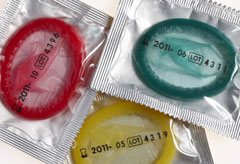Anti-rape condoms - a clever device or a danger to women?
Anti-rape condoms may be handed out in South Africa during the World Cup, but could they cause men to become more violent?

Anti-rape condoms may be handed out in South Africa during the World Cup, but could they cause men to become more violent?
In South Africa, one in four men have admitted to raping someone, and a 2006 Interpol study found that a woman is raped there every 17 seconds.
And with the World Cup coming up, a South African doctor is hoping to distribute 30,000 anti-rape condoms to fight the problem.
Dr Sonnet Ehlers developed the Rape-aXe condom five years ago, a condom-like sheath a woman can insert like a tampon which is embedded with sharp inward-facing spines. If attacked by a man, the spikes cause immediate pain which the attacker extricated himself and the device can only be removed in hospital.
Woman are begging for access to the device, Ehlers says. But critics say the victim risks further attack if the rapist gets angry.
They argue that the Rape-aXe could cause a man to become more violent when he realises he has been trapped, and the device does not prevent penetration, one of the most traumatic aspects of rape.
Do you think the device could succeed as a deterrent to rapists or are anti-rape condoms a risk to women? Join the debate below...
Celebrity news, beauty, fashion advice, and fascinating features, delivered straight to your inbox!
The leading destination for fashion, beauty, shopping and finger-on-the-pulse views on the latest issues. Marie Claire's travel content helps you delight in discovering new destinations around the globe, offering a unique – and sometimes unchartered – travel experience. From new hotel openings to the destinations tipped to take over our travel calendars, this iconic name has it covered.